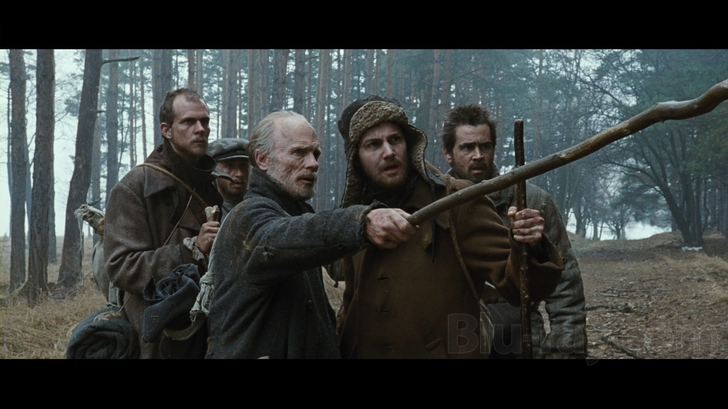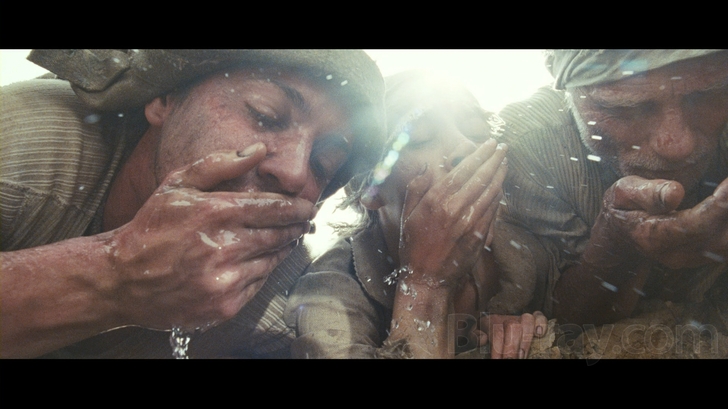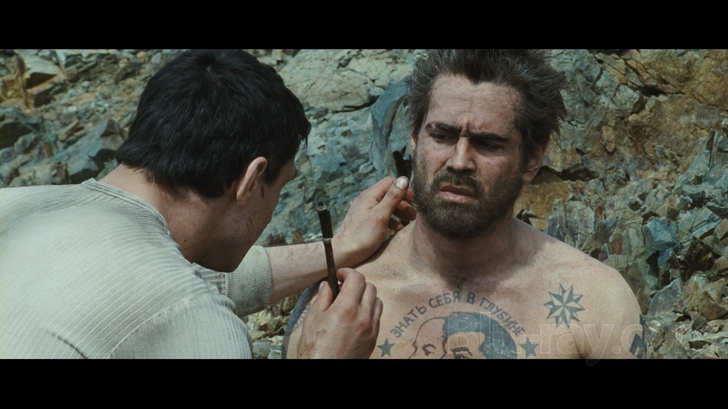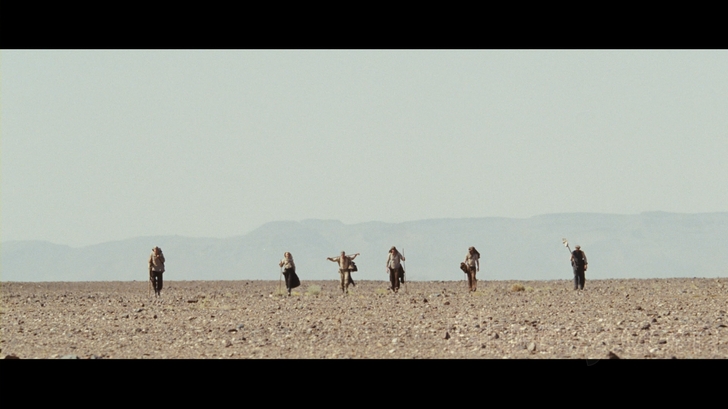The Way Back Blu-ray Movie
HomeThe Way Back Blu-ray Movie 
Image Entertainment | 2010 | 133 min | Rated PG-13 | Apr 22, 2011Movie rating
7.1 | / 10 |
Blu-ray rating
| Users | 4.1 | |
| Reviewer | 4.0 | |
| Overall | 4.1 |
Overview
The Way Back (2010)
A group of multinational prisoners escapes from a Siberian gulag in 1940 and journeys thousands of miles by foot through five hostile countries on their way to freedom in India.
Starring: Ed Harris, Jim Sturgess, Saoirse Ronan, Colin Farrell, Dragos BucurDirector: Peter Weir
| War | Uncertain |
| History | Uncertain |
| Drama | Uncertain |
| Period | Uncertain |
| Epic | Uncertain |
| Adventure | Uncertain |
Specifications
Video
Video codec: MPEG-4 AVC
Video resolution: 1080p
Aspect ratio: 2.35:1
Original aspect ratio: 2.39:1
Audio
English: DTS-HD Master Audio 5.1 (48kHz, 16-bit)
Subtitles
English SDH, Spanish
Discs
25GB Blu-ray Disc
Single disc (1 BD)
Playback
Region A (locked)
Review
Rating summary
| Movie | 3.5 | |
| Video | 4.5 | |
| Audio | 5.0 | |
| Extras | 2.0 | |
| Overall | 4.0 |
The Way Back Blu-ray Movie Review
A gripping 4,000-mile journey that only falters on its last few steps.
Reviewed by Casey Broadwater April 8, 2011Few directors have had as varied a filmography as Sydney-born Peter Weir. In his nearly forty-year career he’s made—amongst others—a cult classic black comedy (The Cars That Ate Paris), an avant-garde period piece mystery (Picnic at Hanging Rock), a supernatural thriller (The Last Wave), a war film (Gallipoli), two movies that helped take Harrison Ford’s acting in an entirely new direction (Witness, The Mosquito Coast), an inspirational prep school drama (Dead Poets Society), a philosophical media satire (The Truman Show), and, in Master and Commander, a globe-spanning 19th century maritime adventure. For his latest film, The Way Back, Weir has tackled one of cinema’s most formidable genres—the David Lean-esque epic. Inspired by Slawomir Rawicz’ The Long Walk—a supposed memoir of dubious authenticity—The Way Back tells the not-entirely-true story of three men who escaped from a Russian gulag in 1941 and hiked south some 4,000 miles, finally finding freedom in northern India. While it may not be a fully factual account, Weir has gone to great lengths to make it plausible, and he succeeds at telling a survival tale that’s harrowing and realistic. Unfortunately, the film’s epic scope is constrained by the relative smallness of its dramatic impact.

The first act is set in a grimy Soviet gulag deep in the five million square miles of Siberia. Here, political prisoners and common criminals fell timber and toil in dangerous mines, subsiding on rations so meager that many of the inmates develop night blindness from vitamin deficiencies. Weir quickly establishes the grim realities of this existence—the bartering and covert scheming, the extreme cold, the sad fact that one man might knife another just to steal his coat. Storytellers are prized for their escapist tales and crude pornographic drawings are traded for scraps of food. It’s a rough life. The prison is enclosed by barbed wire and patrolled by guards with vicious dogs, but the truth, as one official tells the prisoners, is that “nature is your jailer.” Any attempt at escape would almost certainly be a suicide mission, a long, slow death from starvation or hypothermia. That doesn’t stop Januscz (Jim Sturgess), a wrongfully imprisoned Pole, from planning a break with several other desperate men, among them Valka (Colin Farrell), a knife-toting Stalin-sympathizer who wants to escape his debts to the prison’s mob boss, and Mr. Smith (Ed Harris), an American who came to Russia to find work during the Great Depression. The other collaborators are sketched in simple, one-dimensional characterizations; Tomasz (Alexandru Potocean) is an artist, Voss (Gustaf Skarsgård) a pious-but-troubled priest, and Zoran (Dragos Bucur) the resident funny man. Together, they slip through the barbed wire fence during a snowstorm and embark on a journey far more difficult than anything they faced in prison.
The 4,000 mile hike takes the men south through the Siberian forests, around Lake Baikal—where they’re joined by Irena (Saoirse Ronan), a wandering orphan girl who seems to be lying about her past—into communist-run Mongolia, across the Gobi desert, on to Tibet, and finally through the Himalayas into India. It’s no spoiler to reveal that not everyone makes it. Each change in locale presents new challenges to survival—blinding snow and sub-zero temperatures, treacherous frozen lake crossings and swarms of mosquitoes, sunburn, swollen feet, and the anxiety of leaving an oasis for the barren, sun-bleached stretch of nothingness that lies ahead. Tonally, Weir nails the hopeless tedium of the trek, the sheer hunger and exhaustion. When a wolf pack abandons a carcass, we see the men descend upon it like wolves themselves, tearing unhesitantly into the raw flesh. They suffer from hallucinations and talk of cannibalism, although it never comes to that. There are small joys along the way—bathing in the lake, snagging a snake for dinner—and what seems, at times, like the hand of providence, like when the parched, near-dead pilgrims stumble across a well in the middle of nowhere. Weir, always a masterful filmmaker, alternates between intimate scenes of desperation and wide, gorgeous shots of the travelers engulfed in their surroundings. You really feel the smallness of the escapees compared to the enormity of their journey, and as a pure Man- versus-Nature epic, The Way Back is transfixing and visually spectacular.
Where the film falls short of greatness, however, is in the conflict between its characters. Or, rather, the lack thereof. There’s plenty of battling the elements, but the human interactions aren’t nearly as bracing. There are some petty squabbles about which direction to go, hesitancy over whether they should allow Irena to join the group, and wariness over what Valka might do next with his enormous knife, but by and large, these guys get along swimmingly. This is great for their survival tactics, but it makes for less-than-dramatic storytelling. Even the physical temptation of having Irena travel along with these sex-starved gulag escapees is downplayed; she quickly assimilates herself and essentially becomes one of the boys. It doesn’t help that we know almost nothing about the characters, their motivations, or their past lives. Ed Harris’ Mr. Smith offers an explanation—“In the camps you learn to say as little as possible”—but this doesn’t satisfy. It’s hard to root for the survival of the characters when we have little reason to feel invested in their lives. This has nothing to do with the caliber of the acting, which is uniformly excellent. Jim Sturgess seems driven by a deep interior urgency. Colin Farrell relishes playing a semi-feral madman. And at this point in his career, Ed Harris only has to look toward the horizon—his hair grayed and face wizened—to provoke emotion.
As the film reaches the last legs of its journey, the freedom-seeking prisoners do begin to seem less like men and more like game pieces being moved hastily from place to place across a giant map of the Near East. Unlike most epic-sized films, The Way Back rushes too quickly toward a tidy ending. At one point in the final act, our lead protagonist, Januscz, mentions that he plans to “keep walking” until the Soviet Union collapses and he can return to his wife in Poland. This leads to an inelegant and over-obvious transition to the present day: Januscz’ walking feet are superimposed over a series of real-life news clips chronicling communism’s rise and fall. Weir should know better than to be so literal. Still, he’s subtle in other ways. There’s a vein of quiet humor running through the film, adding some much-needed levity, and there’s a fitting sub-text about how humans are at their best when then can override their self-preservationist urges and display genuine kindness to others. In this way, Irena becomes a kind of Christ/Virgin Mary figure, softening the men’s hardheartedness and giving them the compassion necessary to work together towards freedom. You’ll notice that the twiggy makeshift hat she wears in the Gobi desert looks conspicuously like a crown of thorns.
The Way Back Blu-ray Movie, Video Quality 

What would an epic, David Lean-like film be without epic, David Lean-like visuals? Granted, The Way Back is no Lawrence of Arabia or Doctor Zhivago, but you'll sense the heat of the former and the utter chill of the later in the film's fantastic 1080p/AVC-encoded transfer, which handles the story's varied locales with clarity and mood-establishing color. The gulag scenes are appropriately bleak and cast in deep blues, the forests features rich green foliage, the deserts stretches are glazed by bright, sun-baked neutral tones, and the Himalayas are all crisp white snow and vivid skies. Black levels can seem a bit grayish at times—I suspect this is to preserve shadow detail—but contrast is strong, skin tones are balanced, and the image packs plenty of depth and presence. Shot on 35mm, the film sports a rich layer of natural grain, and there are no traces of excess noise reduction or edge enhancement. The image is more than adequately sharp on its own, revealing fine detail in the period accurate gulag sets, the characters' grimy, mud-splattered clothing, and their crinkled, weather-beaten faces. Simply put, this is a great looking film on Blu-ray, and there are no encode issues or compression problems to distract from the immersive visual experience.
The Way Back Blu-ray Movie, Audio Quality 

In a word: Intense. This is one of those films that you'll want to crank up loud—just make sure the neighbors aren't sleeping next door. Like Weir's previous film, Master and Commander, the sound design in The Way Back is brilliantly immersive—generating a real sense of place—and the film's DTS-HD Master Audio 5.1 surround track brings it all to life with precision, forcefulness, and deliciously overpowering rear-channel involvement. Every scene, every environment featured in the film has its own convincing soundscape. I've never suffered in a Soviet gulag, but after the film's first act I felt like I had. Punishingly cold snow-propelling wind rips through the surround speakers, and inside that distinct sound you can hear branches bending and breaking all around you. Down in the mines, explosions trigger sub-woofer swells while tiny rocks and other pieces of debris fly through the air. Elsewhere, rain pours in torrents, bloodthirsty mosquitoes buzz violently, pounding horse hooves encircle us, and a sandstorm creates a granular wind so believable you'll want to cover your eyes and mouth. The effects are just as much a part of Weir's storytelling as his epic visuals. Even quieter scenes reveal thoughtful sound production, with gurgling water and other light outdoorsy noises. Burkhard Dallwitz' score complements the film wonderfully, and the music is just as rich and detailed and dynamic as the sound effects. Dialogue throughout is easy to understand, except, of course, where it's intentionally overwhelmed by the elements. English SDH and Spanish subtitles are available, and with no subtitles selected, English subs automatically appear for dialogue spoken in other languages.
The Way Back Blu-ray Movie, Special Features and Extras 

- The Journey of the Journey (SD, 30:57): The sole bonus feature of substance on the disc is this terrific making-of documentary, which features lots of on-location footage, as well as insightful interviews with Peter Weir and his stable of actors.
- Trailer (SD, 2:00)
The Way Back Blu-ray Movie, Overall Score and Recommendation 

The Way Back opened in limited theaters with almost no promotion, but it definitely deserves to be seen by a wider audience. Despite some narrative shortcomings—the film's ending is exceptionally awkward—director Peter Weir delivers an intense, often grueling experience that takes us on a journey of human perseverance through a series of gorgeously bleak and barren locales. The film looks spectacular on Blu-ray, but better yet, it features an audio track so powerful and convincing that you might get chills when the cold Siberian wind blows through the rear channels. Recommended!
Similar titles
Similar titles you might also like

The Captain
Der Hauptmann
2017

The Great Escape 4K
1963

The Bridge on the River Kwai
1957

Winter in Wartime
Oorlogswinter
2008

The Flowers of War
金陵十三钗 / 金陵十三釵 / Jīnlíng Shísān Chāi
2011

Generation War
Unsere Mütter, unsere Väter
2013

The 12th Man
Den 12. mann
2017

In Darkness
2011

Von Ryan's Express
Fox Studio Classics
1965

Exodus
Limited Edition to 3000
1960

Battle of the Bulge
1965

Into the White
2012

1917 4K
2019

The Conspirator
2010

The Killing Fields
1984

Emperor
2012

The Guns of Navarone
1961

War Horse
2011

Letters from Iwo Jima
2006

Paradise Road
1997
